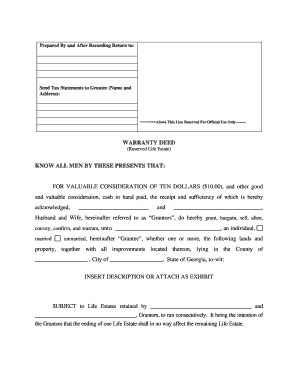Easy Deed Name Changes in Georgia: A Comprehensive Guide
Changing the name on a Georgia deed might seem daunting, but with the right understanding, it's a manageable process. This guide provides a comprehensive overview of how to easily change the name on your Georgia deed, addressing common questions and concerns. Whether you've gotten married, divorced, legally changed your name, or simply need to update the records, this guide will walk you through the necessary steps.
What are the reasons for a deed name change in Georgia?
Several reasons necessitate a name change on a Georgia deed. The most common include:
- Marriage: Upon marriage, a woman often changes her last name, requiring a deed update to reflect this change.
- Divorce: A name change after divorce is another common reason. This often involves reverting to a maiden name or adopting a new surname.
- Legal Name Change: A court-ordered name change necessitates a corresponding change on the deed to maintain accurate property records.
- Correction of Errors: Occasionally, a name might be misspelled on the original deed, demanding a correction.
How to Change the Name on a Georgia Deed: A Step-by-Step Guide
The process involves preparing and filing the correct paperwork with the relevant county office. The exact steps may vary slightly depending on the county, but generally follow this pattern:
-
Gather Necessary Documents: This includes a copy of your current deed, proof of your name change (marriage certificate, divorce decree, court order, etc.), and a government-issued photo ID with your current name.
-
Prepare a Deed Amendment or Quitclaim Deed: Depending on your situation, you’ll either need a deed amendment (to correct errors) or a quitclaim deed (to transfer ownership reflecting the name change). A qualified Georgia attorney can advise on which document is appropriate for your situation. It's highly recommended to seek legal counsel to ensure the document is properly drafted and legally sound.
-
File the Documents: You must file the completed deed amendment or quitclaim deed, along with all supporting documents, at the county courthouse where the property is located. The county probate court or recorder's office handles these filings. Check with your specific county for precise requirements and fees.
-
Pay Required Fees: There will be recording fees associated with filing the amended deed or quitclaim deed. The amount varies based on the county.
-
Record the Deed: Once the paperwork is submitted and fees are paid, the county will record the updated deed in the official property records.
How long does it take to change the name on a Georgia deed?
Processing times can vary depending on the county's workload, but generally, expect a few days to several weeks. Checking the county's website for processing times and potential delays is advised.
What is a quitclaim deed, and when is it used for name changes?
A quitclaim deed transfers ownership of property from one party to another without warranties or guarantees of title. This is typically used in situations where the ownership remains unchanged, just the name needs updating, as in a name change after marriage or a legal name change. It's important to note that a quitclaim deed doesn't guarantee clear title. If there are any title issues, using a quitclaim deed may not resolve them.
What is a deed amendment, and when is it used for name changes?
A deed amendment is used to correct errors on the original deed. If, for instance, your name was misspelled on the original document, a deed amendment is the appropriate method for correction.
Do I need a lawyer to change the name on my Georgia deed?
While not strictly required for simpler cases like a name change after marriage, legal counsel is highly recommended, especially for complex situations or if you're uncertain about the process. A lawyer can ensure the documents are correctly prepared, filed, and legally sound, saving you time and potential problems down the line.
What happens if I don’t update the deed?
While not immediately causing legal issues, failure to update your deed with your name change can create complications when selling, refinancing, or transferring ownership of the property. It could lead to delays, extra costs, and legal challenges.
This information is for general guidance only and does not constitute legal advice. It's crucial to consult with a qualified Georgia real estate attorney for specific legal advice tailored to your circumstances. Always check with your county's official website for the most current information and specific requirements.

